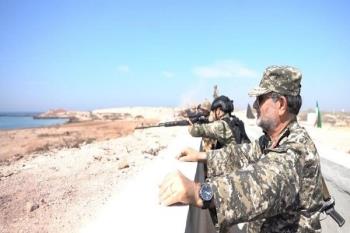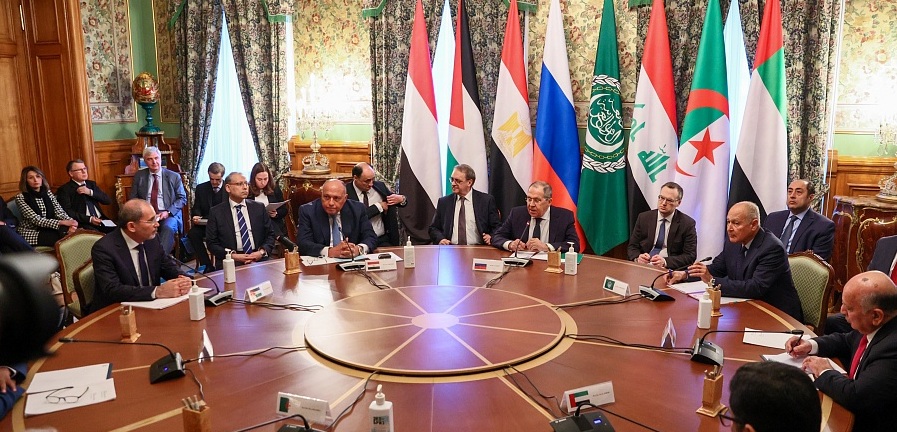Alwaght- Motivated by its historical and territorial traits, military power, permanent UN Security Council seat, and rich natural resources, Russia is looking for a position in the international order that fits its capacities. Under leadership of Vladimir Putin, the country has been working over the past two decades to revive its past global superpower status on the world stage. Beside this factor, Moscow’s geopolitical goals are of great significance, on top of them the push to break the unipolar world order and American hegemony and to work out a multipolar system, as the Russian leaders believe that unilateralism has been a source of crisis not peace.
To this end, especially after Ukraine war and strained relations with the West, Russia realized the importance of various world parts in building a multipolar world. One of Russia’s main policies is to promote regional and international cooperation beyond the peripheral countries of Central Asia and the Caucasus. Meanwhile, due to its geopolitical and economic importance, West Asia has taken a special place in Russia’s foreign policy, and one of the areas where Moscow expanded its relations with this region is military sector.
Recently, Russian broadcaster RT news quoted Alexander Mikheev, general director of Rosoboronexport, a company that manages the export of Russian arms and military equipment, as saying: “[Rosoboronexport] is exploring options for high-tech joint production, including the fifth generation fighters jets, with Middle Eastern countries.”
These comments came days before Abu Dhabi IDEX 2023 arms exhibition that started on February 22 and continues to February 24.
What was revealed by this Russian official about the cooperation between Moscow and the Persian Gulf Arab countries to build advanced weapons, especially a modern and advanced combat aircraft, indicates the improving relations between the Persian Gulf countries and Russia. Still, the decades-long alliance between these monarchies and the US is a factor that questions possibility of a smooth realization of strategic military cooperation between Moscow and these countries.
Arab countries’ thirst for fifth-generation fighter jet
Although the Persian Gulf countries have extensive military ties with the US, they have failed to acquire the fifth-generation F-35 fighter. This failure stems from the American commitment to the strategic military superiority of the Israeli regime, especially in some specific areas, over the past decades. Even while one of the main promises of the White House to the UAE was delivery of F-35 fighters to Abu Dhabi in return for normalization with the Israelis, media reports revealed that the Israeli regime lobbied behind the scenes to block the deal. On the other hand, more than three years ago, Saudi Arabia, in response to American refusal to sell the F-35, spoke for the first time about buying the Sukhoi warplanes from Russia.
Now, taking into consideration this need, Russia has approached the Arabs with the proposal to jointly produce an alternative to the F-35. SU-75 Checkmate is a light, fifth-generation, single-engine Russian fighter that was unveiled on July 20, 2021 at the MAKS-2021 arms exhibition in Moscow.
SU-75 Checkmate is a modern-design mid-size jet with a very low-level radar cross-section, capable of penetrating air defense systems and carrying out tactical attacks in the heart of hostile territory. In combat terms, SU-75 can attack 6 and engage 30 targets simultaneously. It is said to beat its rival F-35 in terms of radar power, which means that the Russian fighter can detect its opponent before the enemy detects it and launch an attack and destroy the enemy aircraft with preemptive engagement.
Such a project definitely requires huge investment, and Russia is trying to advance the project using potential Arab-provided funds in the middle of Western sanctions.
Russian-Persian Gulf military cooperation
Although the Russian relations with the Persian Gulf states, especially Saudi Arabia and the UAE, have seen a major leap recently, especially with the decision of OPEC+ to cut oil production in November 2022, military cooperation has been initiated years ago.
Russian Deputy Foreign Minister Michail Bogdanov in January told Asharq news network that he “would like to confirm the assessment of the Russian leadership that believes Moscow’s relations with the Arab countries, especially with the Persian Gulf countries, are developing in an active and very successful dynamic.”
He added that there was a strong motivation to expand these relations in the visits of Putin to Saudi Arabia and the UAE in October 2019. Also, on February 12, the Russian ambassador to Saudi Arabia, Sergey Koslov, talked about a major development in Moscow-Riyadh relations, adding that these relations are witnessing boost of technical and military cooperation.
In 2018, Russian President Vladimir Putin signed a strategic partnership agreement with the ruler of the UAE, Mohammed bin Zayed, for political, security, economic and cultural cooperation. The Russian defense company Rostec and the Emirates ministry of defense have spoken about readiness for the joint production of SU-75.
Also in 2019, the Russian Direct Investment Fund opened a representation office in Saudi Arabia to explore opportunities beyond the $1.3 billion deal signed during Putin’s visit to Saudi Arabia that year. Saudi Arabia has signed a contract with Rosoboronexport to produce TOS-1A heavy artillery based on the Soviet T-72 battle tank in Saudi Arabia. Saudi Arabia’s General Authority for Military Industries (GAMI) has also licensed the Cornet M1399 anti-tank guided missile and is looking to acquire the technology to make modern AK assault rifles such as the AK-103.
Saudi Arabia has targeted the localization of 50 percent of defense industries and the growth of non-oil sectors in the framework of the Saudi Vision 2030, a roadmap unveiled in 2016 by bin Salman to distance the kingdom from reliance on petrodollars.
In the meantime, it seems that Russia and Saudi Arabia are negotiating a deal for Russian S-400 missile defense system, though many consider the negotiations as a pressure lever by Riyadh to force the White House to deliver the THAAD air defenses, and that it has a very slim chance of materialization.
According to the agreements between the US and Saudi Arabia, Washington is planned to deploy seven batteries of this system to the kingdom between 2023 and 2026.
Also, the Russian strengthening of military relations with Arab countries has also spread to Iraq. In 2012, the Kremlin signed $4 billion worth of arms contracts with the Iraqi government. According to a report published by the state-owned Russian defense industry corporation (Rostec) in 2012, these contracts made Iraq the second largest buyer of Russian arms after India and on a par with China.
A continuation of this trend could begin to change some of the established patterns of arms deals between Western sellers and the Persian Gulf Arab countries.
Challenges and grounds of cooperation
Russia is very well aware that the US’s unbalanced behavior and hostile policy towards some countries in the region have provided the best opportunity for Moscow to be more active in the region. Regional countries have more or less welcomed such a Russian approach and allowed the Russians to bolster ties with Arab world.
For example, the withdrawal of American forces from Afghanistan or disappointment of the Saudi expectation of the American military presence in Syria and protection of Saudi oil giant Aramco’s facilities against Yemeni attacks have raised questions about the seriousness of the Americans in their commitment to security of their allies in the Persian Gulf.
However, some analysts still find the variable of Arab relations with the US important and suggest that broad military cooperation between Russia and Persian Gulf Arab states are difficult to reach and that the Arab tendency to Moscow is mainly to press Washington.
“I think it will be difficult to get to cooperation stage with Russia in the production of the Su-75 fighter, and the United States will not allow this to happen,” Arab analyst Yaser Abdulaziz told Khaleej Online.
Meanwhile, there are some other challenging factors. One is the long record of ideological inconsistency and mutual distrust between Russia and Saudi Arabia. Riyadh was a vital backer of mujaheddin fighting the Soviet Red Army in the 1980s in Afghanistan. The Saudi-backed mujaheddin also participated in post-Soviet conflicts, including second Chechnya war, not to mention Moscow-Riyadh difference of views on Syria, Yemen, and Ukraine.
Still, military partnership with Arab countries in sanctions atmosphere can be both beneficial to Russia geopolitically and economically and helpful to the Arab countries in their departure from utter dependence on the US.



























